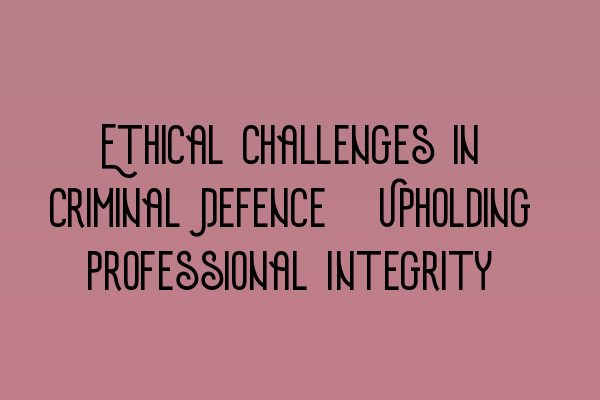Ethical Challenges in Criminal Defence: Upholding Professional Integrity
Defending individuals accused of crimes is a noble profession. Criminal defence lawyers play a vital role in upholding justice and ensuring that every person receives a fair trial. However, this profession is not without its ethical challenges. In this article, we will explore some of the key ethical dilemmas faced by criminal defence lawyers and how they can navigate these challenges while maintaining their professional integrity.
The Duty of Confidentiality
One of the fundamental ethical responsibilities of a criminal defence lawyer is the duty of confidentiality. Clients must trust that their lawyer will keep their information private and not disclose it to anyone without their consent. However, this duty may clash with the lawyer’s obligation to comply with legal requirements, such as disclosing information in the interest of preventing harm.
To strike the right balance, criminal defence lawyers must carefully consider the potential consequences of breaching confidentiality. They should prioritize their clients’ trust while also ensuring that they do not participate in any illegal activities or enable harm to others.
Conflicts of Interest
Conflicts of interest can arise in criminal defence cases when a lawyer’s personal or professional interests conflict with their obligation to act in the best interests of their client. This can jeopardize the lawyer’s ability to provide unbiased advice and representation.
To avoid conflicts of interest, criminal defence lawyers must be diligent in identifying potential conflicts and taking appropriate steps to address them. This may include declining representation, seeking informed consent from all affected parties, or withdrawing from the case if a conflict emerges during the course of representation.
Prosecutorial Misconduct
Criminal defence lawyers must also be wary of prosecutorial misconduct. This occurs when prosecutors engage in unethical or illegal practices, such as withholding evidence or making false statements, to secure a conviction. Ethical defence lawyers have a duty to address and challenge such misconduct to ensure fair and just proceedings.
By diligently investigating the facts of a case, scrutinizing the prosecution’s evidence, and advocating for their clients’ rights, ethical criminal defence lawyers can help expose any prosecutorial misconduct and contribute to the integrity of the justice system.
Client Autonomy
Respecting client autonomy is another ethical challenge for criminal defence lawyers. While lawyers have an obligation to provide competent legal advice, they must also respect their clients’ decisions, even if they disagree with them.
Encouraging open and honest communication, discussing the potential consequences of different courses of action, and providing legal guidance can help lawyers assist their clients without compromising their autonomy. Balancing professional expertise with client autonomy is crucial to upholding professional integrity in criminal defence.
Wrap-up
Being a criminal defence lawyer is a demanding profession that requires navigating various ethical challenges. Upholding professional integrity in the face of these challenges is essential for both the lawyer and the justice system as a whole. By maintaining strict confidentiality, avoiding conflicts of interest, challenging prosecutorial misconduct, and respecting client autonomy, criminal defence lawyers can ensure they fulfill their ethical obligations while representing their clients effectively.
For more resources and information about the SQE exams and preparation courses, please visit the following articles:
- SQE 1 Practice Exam Questions
- SQE 1 Practice Mocks FLK1 FLK2
- SQE 2 Preparation Courses
- SQE 1 Preparation Courses
- SRA SQE Exam Dates
